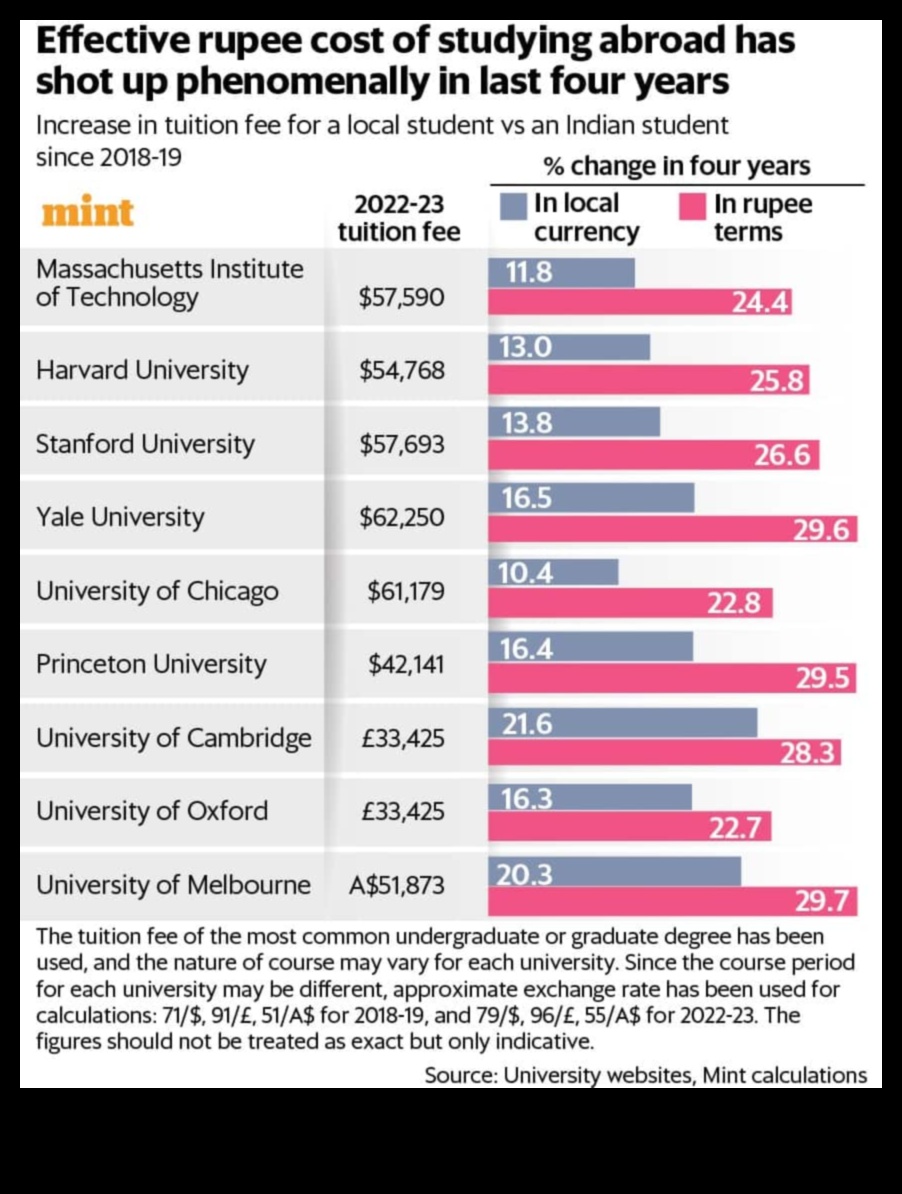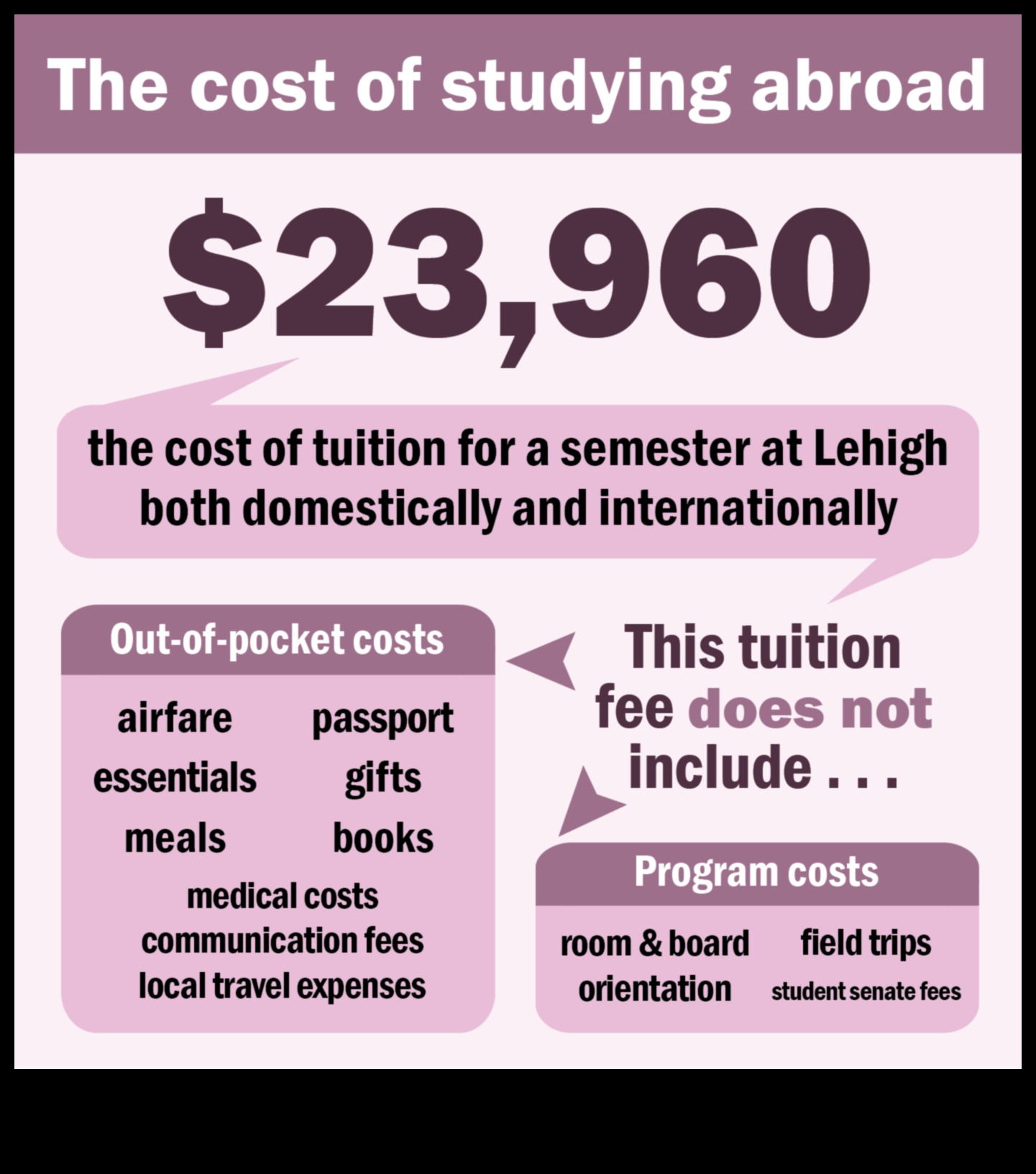
Cost of Studying Abroad
The cost of studying abroad can vary significantly depending on the country you choose to study in, the length of your program, and your lifestyle.
In general, the cost of tuition and fees for studying abroad will be higher than the cost of studying at a domestic university. However, there are many ways to reduce the cost of studying abroad, such as scholarships, financial aid, and working part-time.
Here are some factors that affect the cost of studying abroad:
- Country: The cost of studying abroad will vary significantly depending on the country you choose to study in. For example, studying in Europe will typically be more expensive than studying in Asia or Latin America.
- Program length: The length of your study abroad program will also affect the cost. A shorter program will typically be less expensive than a longer program.
- Your lifestyle: Your lifestyle choices will also affect the cost of studying abroad. If you choose to live in a dorm or share an apartment with other students, you will typically spend less money than if you choose to live in a private apartment.
For more information on the cost of studying abroad, you can visit the following websites:
| Feature | Answer |
|---|---|
| Cost of Studying Abroad | The cost of studying abroad varies depending on the country, university, and program you choose. However, you can expect to pay an average of $20,000-$40,000 per year for tuition, room and board, and living expenses. |
| Study Abroad Scholarships | There are many scholarships available to help students finance their study abroad experience. Some of the most popular scholarships include the Fulbright Scholarship, the Gates Cambridge Scholarship, and the Schwarzman Scholarship. |
| Financial Aid for Studying Abroad | If you are eligible for financial aid, you may be able to use it to help pay for your study abroad experience. Some colleges and universities offer their own financial aid programs for study abroad, and there are also government-funded programs such as the FAFSA and the FSEOG. |
| Best Countries to Study Abroad | There are many great countries to study abroad, each with its own unique advantages. Some of the most popular study abroad destinations include the United Kingdom, Australia, Canada, and New Zealand. |
| Cheapest Countries to Study Abroad | If you are looking for a budget-friendly study abroad experience, there are many great options available. Some of the cheapest countries to study abroad include Thailand, Vietnam, and China. |

2. Factors Affecting the Cost of Studying Abroad
The cost of studying abroad can vary significantly depending on a number of factors, including:
- The country you choose to study in
- The city you choose to study in
- The type of program you choose
- Your living expenses
- Your travel expenses
In this section, we will discuss each of these factors in more detail and provide you with an estimate of how much you can expect to spend on each.
3. How to Calculate the Cost of Studying Abroad
There are a few different factors to consider when calculating the cost of studying abroad, including:
* Tuition fees: The cost of tuition fees will vary depending on the university or college you choose to study at. In general, tuition fees for international students are higher than for domestic students.
* Living expenses: The cost of living expenses will vary depending on the country you choose to study in. In general, living expenses are higher in Western Europe and North America than in other parts of the world.
* Airfare: The cost of airfare will vary depending on your starting point and your destination.
* Insurance: You may need to purchase travel insurance to cover medical expenses, lost luggage, and other unexpected costs.
* Other expenses: You may also need to factor in other expenses, such as visa fees, application fees, and the cost of books and supplies.
Once you have considered all of these factors, you can get a rough estimate of the total cost of studying abroad. It is important to remember that this is just an estimate, and the actual cost may vary depending on your individual circumstances.
4. Scholarships and Financial Aid for Studying Abroad
There are a number of scholarships and financial aid opportunities available for students who want to study abroad. These scholarships can help to reduce the cost of studying abroad, making it more affordable for students from all backgrounds.
Some of the most popular scholarships for studying abroad include the Fulbright Scholarship, the Gates Cambridge Scholarship, and the Rhodes Scholarship. These scholarships are highly competitive, but they can provide students with full funding for their study abroad programs.
In addition to these major scholarships, there are also a number of smaller scholarships and grants that are available for students who want to study abroad. These scholarships are often offered by universities, colleges, and other organizations.
Students who are interested in finding scholarships and financial aid for studying abroad should start by doing their research. There are a number of resources available online that can help students find scholarships that are a good fit for them.
Some of the best resources for finding scholarships and financial aid for studying abroad include:
Students who are interested in studying abroad should also talk to their academic advisor or financial aid office. These offices can often help students find scholarships and financial aid that they may not be aware of.

5. Tips for Reducing the Cost of Studying Abroad
Here are some tips for reducing the cost of studying abroad:
- Apply for scholarships and financial aid. There are many scholarships and financial aid opportunities available for students who want to study abroad.
- Choose a country that is affordable. The cost of studying abroad varies significantly from country to country. Do your research and choose a country that you can afford.
- Consider studying at a public university. Public universities are usually more affordable than private universities.
- Live in a shared accommodation. Living in a shared accommodation can help you save money on rent.
- Cook your own meals. Eating out can be expensive, so try to cook your own meals whenever possible.
- Get a part-time job. Working part-time can help you supplement your income and cover your living expenses.
- Save money before you go. The sooner you start saving money, the more money you will have to cover the cost of your study abroad experience.
By following these tips, you can save money on your study abroad experience and make it more affordable.
6. The Best Countries to Study Abroad for Cheap
There are many factors to consider when choosing a country to study abroad, including the cost of living. Some countries are more expensive than others, so it’s important to factor in your budget when making your decision.
Here are some of the best countries to study abroad for cheap:
- Czech Republic
- Poland
- Hungary
- Slovakia
- Romania
These countries all offer a high quality of education at a relatively low cost. The cost of living is also relatively low, making these countries a great option for students on a budget.
Of course, there are many other great countries to study abroad for cheap. Do your research and find a country that’s a good fit for you both academically and financially.
Here are some additional resources that you may find helpful:
- The Cheapest Countries to Study Abroad
- The 10 Cheapest Countries to Study Abroad
- The 10 Cheapest Countries to Study Abroad for International Students

7. The Most Expensive Countries to Study Abroad
The cost of studying abroad can vary significantly from country to country. Some of the most expensive countries to study abroad include Switzerland, Norway, and Denmark. These countries have high costs of living, and tuition fees at their universities are also relatively high.
Other expensive countries to study abroad include Australia, Canada, and the United States. These countries are all popular destinations for international students, and their universities offer a wide range of programs. However, the cost of tuition and living expenses can be high.
If you are considering studying abroad, it is important to do your research and compare the costs of different countries. You should also consider your budget and what you are willing to spend on your study abroad experience.
Here is a list of the most expensive countries to study abroad, based on the average cost of tuition and living expenses:
- Switzerland
- Norway
- Denmark
- Australia
- Canada
- United States
- United Kingdom
- Japan
- Singapore
8. The Best Time to Study Abroad
The best time to study abroad depends on your personal preferences and academic goals. Here are a few things to consider when choosing a time to study abroad:
- The weather: If you’re planning to study in a warm climate, you’ll want to avoid the summer months. If you’re planning to study in a cold climate, you’ll want to avoid the winter months.
- The school year: Most universities and colleges offer study abroad programs during the fall and spring semesters. However, some schools also offer programs during the summer or winter.
- Your academic schedule: If you’re taking classes at your home university, you’ll need to make sure that your study abroad program fits into your academic schedule.
- Your budget: The cost of studying abroad can vary significantly depending on the time of year.
Once you’ve considered these factors, you can start to narrow down your options and choose the best time to study abroad for you.
9. The Best Way to Finance Your Study Abroad Experience
There are many different ways to finance your study abroad experience. The best way for you will depend on your individual circumstances. Some of the most common ways to finance study abroad include:
- Scholarships and financial aid
- Student loans
- Savings and personal contributions
- Working while studying abroad
- Participating in a study abroad program
Each of these options has its own advantages and disadvantages. It is important to weigh the pros and cons of each option before making a decision.
Scholarships and financial aid can be a great way to finance your study abroad experience. There are many different scholarships available, so you should do your research to find the ones that you are eligible for. Student loans can also be a helpful option, but it is important to be aware of the terms and conditions of the loan before you take it out.
Savings and personal contributions are another way to finance your study abroad experience. If you have the money saved up, this can be a great option. However, it is important to be realistic about how much money you will need and to make sure that you have enough savings to cover all of your expenses.
Working while studying abroad can be a great way to earn money to help cover your expenses. There are many different ways to find work while studying abroad, such as working in a bar or restaurant, tutoring, or doing research.
Participating in a study abroad program can be a great way to finance your experience. Many study abroad programs offer scholarships and financial aid, and they can also help you find work while you are abroad.
Ultimately, the best way to finance your study abroad experience will depend on your individual circumstances. There is no one-size-fits-all solution. By doing your research and weighing the pros and cons of each option, you can find the best way to finance your study abroad experience.
FAQ about the Cost of Studying Abroad
Question 1: How much does it cost to study abroad?
The cost of studying abroad can vary significantly depending on the country, university, and program you choose. In general, you can expect to pay between $10,000 and $50,000 per year for tuition, room and board, and other expenses.
Question 2: What are the factors that affect the cost of studying abroad?
The following factors can affect the cost of studying abroad:
- The country you choose to study in
- The university you choose to attend
- The program you choose to study
- Your living expenses
Question 3: How can I reduce the cost of studying abroad?
There are a number of ways to reduce the cost of studying abroad, including:
- Applying for scholarships and financial aid
- Choosing a less expensive country to study in
- Living with a local family or in a student dormitory
- Working part-time while you study